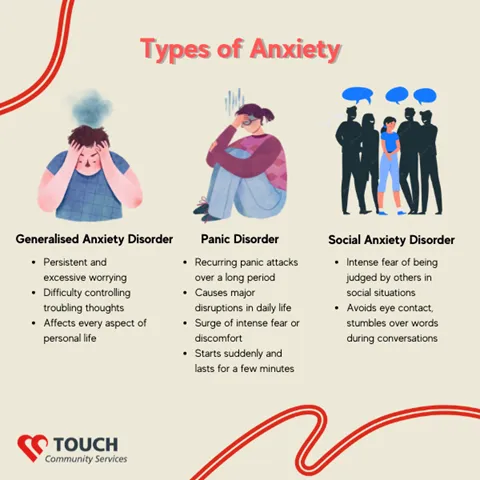Back to Tips & Articles
The Many Faces of Anxiety
Tips & Articles
Mental Wellness
24 Oct 2022
Anxiety symptoms manifest differently from person to person. Some behaviours that you or other people normally exhibit could be a symptom of an anxiety disorder. We find out some common behaviours that people with anxiety disorders could exhibit.

There are times when we feel anxious because of certain events or occurrences in our lives. Anxiety is a normal human emotion and a healthy dose of it can even motivate us to take charge and perform better.
However, having too much stress in one’s environment or stretching yourself beyond your capabilities could lead to unhealthy levels of anxiety. Anxiety becomes an issue when it becomes unexpectedly severe or lasts longer than it should after a stressful situation has ended and starts to affect your ability to perform daily tasks, such as, going to work or school or meeting people.
Anxiety can be caused by several factors, such as, trauma, accumulated stress, having other mental health conditions, adverse family circumstances, genetics, and grief and loss. It also manifests itself in different types of anxiety disorders.
The three main types of anxiety disorders are presented in the infographic below.

Anxiety symptoms manifest differently from person to person. Some behaviours that you or other people normally exhibit could be a symptom of an anxiety disorder. Here are some common behaviours that people with anxiety disorders could exhibit.
Avoidant person: Some people with anxiety disorder consciously or unconsciously avoid problems to prevent uncomfortable thoughts from surfacing. They usually hesitate to address the root cause of a problem immediately due to underlying fears of rejection. An example of avoidant behaviour is procrastination. A person with anxiety may have a hard time starting a project and may hold it off until the last minute. More often than not, an anxious person who tries avoiding a problem ends up becoming more stressed and it may trigger other anxiety symptoms such as insomnia or nausea [1].
People pleaser: A people pleaser is defined as someone who does kind gestures for others at their own expense, for external validation [2]. Individuals with social anxiety tend to behave in this manner because they are afraid of offending their peers. In extreme cases, an anxious person resorts to fawning [3], which is the complete removal of individuality to appease others, as a means to survive adverse situations. Someone who shows people pleasing behaviour usually has a hard time establishing boundaries and saying no to others. They might even feel guilty for speaking up about their own needs.
Socially awkward person: A person with an anxiety disorder may struggle socialising with others and have little experience on how to navigate certain situations as a result. They may find it difficult to start and maintain a conversation because they fear social interaction or being singled out by the rest of the community. People with anxiety may even show physical symptoms such as breathlessness or tremble during conversations. Social interactions become very taxing for people with anxiety, with some even feeling dazed or blank headed after their encounters.
There is light at the end of the tunnel
Living with anxiety disorder, depending on the severity of the condition, can be debilitating. However, the condition is treatable, and one can seek support to cope with it.
Speaking to friends and loved ones about what you are experiencing helps lighten the emotional burden that you may be carrying. Having someone checking in on you may also help you feel less isolated and helpless.
You may also choose to see a doctor or mental health professional for psychotherapy. Psychotherapy helps to unravel underlying causes which may be causing your anxiety and provide opportunities for you to overcome the condition. Doctors are also able to prescribe medication to help with alleviating tension so that the anxiety doesn’t get too overwhelming. Lastly, you can practice techniques that help to manage stress, such as deep breathing and relaxation techniques. Simple relaxation techniques may help you be more mindful of the present moment, relax and regain control.
Are you seeking help for your mental health or simply need a listening ear? TOUCH Mental Wellness is here to support you. Please call TOUCHline at 1800 377 2252 (Mondays to Fridays, 9am to 6pm) to speak with a counsellor.
TOUCH Mental Wellness (TMW) runs personalised therapy and counselling programmes to empower individuals to rise above their circumstances. An advocate of mental wellness, TMW has been organising mental wellness awareness mass runs, talks and workshops since 2015. It works closely with corporations to conduct mental wellness talks with an aim of equipping employees with handles to cope with stress and help them build resilience. It also specialises in mental wellness awareness and educational programmes for schools.
References
1. Scott, Elizabeth. “Avoidance Coping and Why It Creates Additional Stress". VeryWellMind. 22 Feb 2022. https://www.verywellmind.com/avoidance-coping-and-stress-4137836.
2. Villiness, Zawn. Wade, Danielle. "People pleaser: What it means and how to stop”. MedicalNewsToday. 27 May 2022. https://www.medicalnewstoday.com/articles/people-pleaser.
3. Ryder, Gina. Gepp, Karin. "The Fawn Response: How Trauma Can Lead To People-Pleasing". PsychCentral. 9 Jan 2022. https://psychcentral.com/health/fawn-response.
However, having too much stress in one’s environment or stretching yourself beyond your capabilities could lead to unhealthy levels of anxiety. Anxiety becomes an issue when it becomes unexpectedly severe or lasts longer than it should after a stressful situation has ended and starts to affect your ability to perform daily tasks, such as, going to work or school or meeting people.
Anxiety can be caused by several factors, such as, trauma, accumulated stress, having other mental health conditions, adverse family circumstances, genetics, and grief and loss. It also manifests itself in different types of anxiety disorders.
The three main types of anxiety disorders are presented in the infographic below.

Who can have anxiety disorders?
Anxiety symptoms manifest differently from person to person. Some behaviours that you or other people normally exhibit could be a symptom of an anxiety disorder. Here are some common behaviours that people with anxiety disorders could exhibit.
Avoidant person: Some people with anxiety disorder consciously or unconsciously avoid problems to prevent uncomfortable thoughts from surfacing. They usually hesitate to address the root cause of a problem immediately due to underlying fears of rejection. An example of avoidant behaviour is procrastination. A person with anxiety may have a hard time starting a project and may hold it off until the last minute. More often than not, an anxious person who tries avoiding a problem ends up becoming more stressed and it may trigger other anxiety symptoms such as insomnia or nausea [1].
People pleaser: A people pleaser is defined as someone who does kind gestures for others at their own expense, for external validation [2]. Individuals with social anxiety tend to behave in this manner because they are afraid of offending their peers. In extreme cases, an anxious person resorts to fawning [3], which is the complete removal of individuality to appease others, as a means to survive adverse situations. Someone who shows people pleasing behaviour usually has a hard time establishing boundaries and saying no to others. They might even feel guilty for speaking up about their own needs.
Socially awkward person: A person with an anxiety disorder may struggle socialising with others and have little experience on how to navigate certain situations as a result. They may find it difficult to start and maintain a conversation because they fear social interaction or being singled out by the rest of the community. People with anxiety may even show physical symptoms such as breathlessness or tremble during conversations. Social interactions become very taxing for people with anxiety, with some even feeling dazed or blank headed after their encounters.
There is light at the end of the tunnel
Living with anxiety disorder, depending on the severity of the condition, can be debilitating. However, the condition is treatable, and one can seek support to cope with it.Speaking to friends and loved ones about what you are experiencing helps lighten the emotional burden that you may be carrying. Having someone checking in on you may also help you feel less isolated and helpless.
You may also choose to see a doctor or mental health professional for psychotherapy. Psychotherapy helps to unravel underlying causes which may be causing your anxiety and provide opportunities for you to overcome the condition. Doctors are also able to prescribe medication to help with alleviating tension so that the anxiety doesn’t get too overwhelming. Lastly, you can practice techniques that help to manage stress, such as deep breathing and relaxation techniques. Simple relaxation techniques may help you be more mindful of the present moment, relax and regain control.
Are you seeking help for your mental health or simply need a listening ear? TOUCH Mental Wellness is here to support you. Please call TOUCHline at 1800 377 2252 (Mondays to Fridays, 9am to 6pm) to speak with a counsellor.
TOUCH Mental Wellness (TMW) runs personalised therapy and counselling programmes to empower individuals to rise above their circumstances. An advocate of mental wellness, TMW has been organising mental wellness awareness mass runs, talks and workshops since 2015. It works closely with corporations to conduct mental wellness talks with an aim of equipping employees with handles to cope with stress and help them build resilience. It also specialises in mental wellness awareness and educational programmes for schools.
References
1. Scott, Elizabeth. “Avoidance Coping and Why It Creates Additional Stress". VeryWellMind. 22 Feb 2022. https://www.verywellmind.com/avoidance-coping-and-stress-4137836.
2. Villiness, Zawn. Wade, Danielle. "People pleaser: What it means and how to stop”. MedicalNewsToday. 27 May 2022. https://www.medicalnewstoday.com/articles/people-pleaser.
3. Ryder, Gina. Gepp, Karin. "The Fawn Response: How Trauma Can Lead To People-Pleasing". PsychCentral. 9 Jan 2022. https://psychcentral.com/health/fawn-response.


